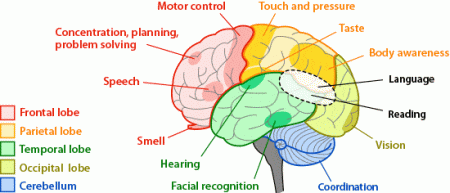10 Dangerous Brain-Damaging Habits to Stop Immediately
1. Boredom
Neuroplasticity is the ability of the brain to think in different ways, make new connections, and retain memories. Without intellectual stimulation, your brain—like any other organ—will atrophy.
2. No Breakfast
It’s not just something your mother used to nag you about: breakfast is the most important meal of the day. Without it, not only will you feel sluggish but your brain—that’s revving up for another busy day—hasn’t been fed in many hours. Running on empty without proper nutrition day after day will cause your metabolism to slow and your brain to shut down some functions—permanently.
In addition, a Japanese study found that people who routinely skip breakfast are thirty-six percent more likely to suffer a brain hemorrhage. Many studies support the observation that the brain performs better if properly nourished every morning; from a professor of pediatrics at Duke University:
“Without glucose our brain simply doesn’t operate as well. People have difficulty understanding new information, [they have a] problem with visual and spatial understanding, and they don’t remember things as well.”
Eating breakfast also curbs cravings and over-eating later in the day.
3. Cell phones
This is one of those controversial subjects for which you can find studies landing on both sides of the issue, depending on the particular bias of the research.
Electromagnetic fields exude radiation and we know that exposure to radiation in close proximity and for extended periods is detrimental to human health. At the very least, sleeping with your cell phone next to your bed is distracting and can disrupt sleep.
A Swedish study found that the radiation from a cell phone can also cause headaches and confusion. Another recent study established a definite link between cell phone radiation and cancers, including brain tumors.
Use a headset and limit cell phone use, turning it off and putting it as far away from you as possible as often as possible.
4. Working through illness
If you’re sick, rest and eat properly. There is almost nothing that can’t wait a day. When you are ill—even with a simple cold—your body’s immune system is already working at full capacity to fight the infection. You will not only prolong your illness but increase vulnerability to subsequent maladies, with cumulative effects that can impair brain function.
5. Over-eating
Over-eating leads to excess weight, often to obesity. We’re not talking ODing on kale. Often when someone eats more than is necessary, the food that’s taken in is lacking in nutrition; the body remains hungry because it’s not getting what it needs in the form of nutrition and so we eat more.
Nutrient-poor foods do not optimize brain performance. In addition, chronic obesity has been directly associated with low brain volume and dementia.
6. Reticence
Oral communication uses a different part of the brain than written. If you don’t often talk to other people, you don’t exercise this part of the brain. Additionally, we are social animals and are meant to talk to one another; lack of social interaction can cause depression and anxiety—also products of the brain.
7. Sleep Deprivation
Not enough emphasis can be put on the value of regular, good quality, adequate amounts of sleep. Your brain is as active while sleeping as while awake.
Two of the critical activities that take place while you sleep are the long-term storage of memories and daily housekeeping, eliminating toxins.
Without enough sleep, your memory suffers and you run a much greater risk of neurodegenerative disease due to plaque accumulation.
8. Smoking
Cigarettes contain a host of toxic chemicals, many adversely affecting the brain. From 2004 research:
“The study found that cigarette smoking alone caused damage to neuronal viability and cell membranes in the midbrain and on cell membranes of the cerebellar vermis. These brain regions are involved in fine and gross motor functions and balance and coordination.”
Best to quit before you start drooling. The good news is that the body is extraordinarily resilient and most of any damage caused by smoking will be repaired over a relatively short time.
9. Sugar
Too much sugar intake is bad for every system in your body, including the central nervous system. Studies have shown links between regular excess sugar ingestion and Alzheimer’s disease.
10. Air pollution
This is a biggie. The only way to avoid air pollution is to continuously wear an oxygen mask. The air we breathe is full of harmful particles that affect all facets of the human condition.
Air pollution has been found to cause brain shrinkage and cognitive impairment, amongst other things. What we breathe and absorb through skin moves through the bloodstream, permeating every organ—including the brain.
Researchers have linked air pollution to the development and exacerbation of neurodegenerative diseases like Parkinson’s and Alzheimer’s.
What’s more, ambient air pollution is just as bad. There really is no small-scale solution to this. Banning geoengineering would be a great start.
Below is an excerpt from an article by neurologist Russell L. Blaylock, MD:
“My major concern is that there is evidence that they are spraying tons of nanosized aluminum compounds. It has been demonstrated in the scientific and medical literature that nanosized particles are infinitely more reactive and induce intense inflammation in a number of tissues. Of special concern is the effect of these nanoparticles on the brain and spinal cord, as a growing list of neurodegenerative diseases, including Alzheimer’s dementia, Parkinson’s disease, and Lou Gehrig’s disease (ALS) are strongly related to exposure to environmental aluminum.
“Studies have shown that these particles pass along the olfactory neural tracts, which connect directly to the area of the brain that is not only most affected by Alzheimer’s disease, but also the earliest affected in the course of the disease. It also has the highest level of brain aluminum in Alzheimer’s cases.
“The intranasal route of exposure makes spraying of massive amounts of nanoaluminum into the skies especially hazardous, as it will be inhaled by people of all ages, including babies and small children for many hours. We know that older people have the greatest reaction to this airborne aluminum. Because of the nanosizing of the aluminum particles being used, home-filtering systems will not remove the aluminum, thus prolonging exposure, even indoors.”
Neuroplasticity is the ability of the brain to think in different ways, make new connections, and retain memories. Without intellectual stimulation, your brain—like any other organ—will atrophy.
2. No Breakfast
It’s not just something your mother used to nag you about: breakfast is the most important meal of the day. Without it, not only will you feel sluggish but your brain—that’s revving up for another busy day—hasn’t been fed in many hours. Running on empty without proper nutrition day after day will cause your metabolism to slow and your brain to shut down some functions—permanently.
In addition, a Japanese study found that people who routinely skip breakfast are thirty-six percent more likely to suffer a brain hemorrhage. Many studies support the observation that the brain performs better if properly nourished every morning; from a professor of pediatrics at Duke University:
“Without glucose our brain simply doesn’t operate as well. People have difficulty understanding new information, [they have a] problem with visual and spatial understanding, and they don’t remember things as well.”
Eating breakfast also curbs cravings and over-eating later in the day.
3. Cell phones
This is one of those controversial subjects for which you can find studies landing on both sides of the issue, depending on the particular bias of the research.
Electromagnetic fields exude radiation and we know that exposure to radiation in close proximity and for extended periods is detrimental to human health. At the very least, sleeping with your cell phone next to your bed is distracting and can disrupt sleep.
A Swedish study found that the radiation from a cell phone can also cause headaches and confusion. Another recent study established a definite link between cell phone radiation and cancers, including brain tumors.
Use a headset and limit cell phone use, turning it off and putting it as far away from you as possible as often as possible.
4. Working through illness
If you’re sick, rest and eat properly. There is almost nothing that can’t wait a day. When you are ill—even with a simple cold—your body’s immune system is already working at full capacity to fight the infection. You will not only prolong your illness but increase vulnerability to subsequent maladies, with cumulative effects that can impair brain function.
5. Over-eating
Over-eating leads to excess weight, often to obesity. We’re not talking ODing on kale. Often when someone eats more than is necessary, the food that’s taken in is lacking in nutrition; the body remains hungry because it’s not getting what it needs in the form of nutrition and so we eat more.
Nutrient-poor foods do not optimize brain performance. In addition, chronic obesity has been directly associated with low brain volume and dementia.
6. Reticence
Oral communication uses a different part of the brain than written. If you don’t often talk to other people, you don’t exercise this part of the brain. Additionally, we are social animals and are meant to talk to one another; lack of social interaction can cause depression and anxiety—also products of the brain.
7. Sleep Deprivation
Not enough emphasis can be put on the value of regular, good quality, adequate amounts of sleep. Your brain is as active while sleeping as while awake.
Two of the critical activities that take place while you sleep are the long-term storage of memories and daily housekeeping, eliminating toxins.
Without enough sleep, your memory suffers and you run a much greater risk of neurodegenerative disease due to plaque accumulation.
8. Smoking
Cigarettes contain a host of toxic chemicals, many adversely affecting the brain. From 2004 research:
“The study found that cigarette smoking alone caused damage to neuronal viability and cell membranes in the midbrain and on cell membranes of the cerebellar vermis. These brain regions are involved in fine and gross motor functions and balance and coordination.”
Best to quit before you start drooling. The good news is that the body is extraordinarily resilient and most of any damage caused by smoking will be repaired over a relatively short time.
9. Sugar
Too much sugar intake is bad for every system in your body, including the central nervous system. Studies have shown links between regular excess sugar ingestion and Alzheimer’s disease.
10. Air pollution
This is a biggie. The only way to avoid air pollution is to continuously wear an oxygen mask. The air we breathe is full of harmful particles that affect all facets of the human condition.
Air pollution has been found to cause brain shrinkage and cognitive impairment, amongst other things. What we breathe and absorb through skin moves through the bloodstream, permeating every organ—including the brain.
Researchers have linked air pollution to the development and exacerbation of neurodegenerative diseases like Parkinson’s and Alzheimer’s.
What’s more, ambient air pollution is just as bad. There really is no small-scale solution to this. Banning geoengineering would be a great start.
Below is an excerpt from an article by neurologist Russell L. Blaylock, MD:
“My major concern is that there is evidence that they are spraying tons of nanosized aluminum compounds. It has been demonstrated in the scientific and medical literature that nanosized particles are infinitely more reactive and induce intense inflammation in a number of tissues. Of special concern is the effect of these nanoparticles on the brain and spinal cord, as a growing list of neurodegenerative diseases, including Alzheimer’s dementia, Parkinson’s disease, and Lou Gehrig’s disease (ALS) are strongly related to exposure to environmental aluminum.
“Studies have shown that these particles pass along the olfactory neural tracts, which connect directly to the area of the brain that is not only most affected by Alzheimer’s disease, but also the earliest affected in the course of the disease. It also has the highest level of brain aluminum in Alzheimer’s cases.
“The intranasal route of exposure makes spraying of massive amounts of nanoaluminum into the skies especially hazardous, as it will be inhaled by people of all ages, including babies and small children for many hours. We know that older people have the greatest reaction to this airborne aluminum. Because of the nanosizing of the aluminum particles being used, home-filtering systems will not remove the aluminum, thus prolonging exposure, even indoors.”





